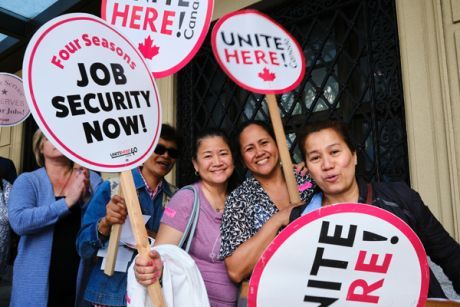News
You are here
Solidarity with Vancouver hospitality workers

July 9, 2019
Outside the prestigious Rosewood Hotel Georgia, signs with the words “One Job Should Be Enough” fluttered among over 300 primarily hospitality staff protesting working conditions at the 5-star establishment.
Members of UNITE HERE 40 from Rosewood, Four Seasons, Hyatt, Westin Bayshore and Pinnacle Habourfront in Vancouver are in contract negotiations, calling for an end to the rampant cuts to workers’ hours, and a commitment to “address specific concerns about discrimination and harassment in an effort to improve the working environment.”
One Rosewood Hotel worker explained that due to the progressive cuts, they must work a second job to make ends meet. Another worker pointed out a glaring irony that while Rosewood has been rated the best hotel in Canada, its staff often lack the supplies to complete their jobs and are concerned for their safety.
“5-star hotel, 1-star jobs”
A cook at the Rosewood, James Sugden said, “We provide a very high level of service at our hotel and have been consistently recognized for our quality. We need jobs and wages that match the excellent service we provide to our guests every day.”
According to Destination BC Research and Analytics, the value created by the tourism industry represented $9 billion added to the GDP of British Columbia in 2017. The industry generated more GDP than any other primary resource industry. Mining came in second at $4.9 billion. The B.C. government reported that “the tourism industry contributed nearly $1.2 billion in provincial taxes in 2017, an increase of 40.3% from 2007.”
It is worth nothing that this rapidly growing industry depends on the service area of overnight visitation, accommodation and food. This specific service area made it possible for the 10.3 million tourists to visit the 19,243 small to mid-size tourism related businesses in operation in B.C. in 2017.
Truly, the backbone of the industry.
Despite generating a steady flux of prestige and value, the hospitality workers in this service area find themselves faced with job precarity, unsafe working conditions, and instances of harassment toward female staff.
The hotel industry in B.C. has been adopting a practice of classifying workers as full-time staff and routinely assigning them less than 40 hours of work per week. The workers have to be available on-call, creating a catch-22 where a second or third job is needed to make ends meet, but the time to perform the labour has already been stolen in the first place.
“One recent summer, over 20 of my co-workers were on WCB (WorkSafeBC) because of injuries caused by the high workload in only two months. Even though my hotel is making tons of money, I don’t even have stable 40 hours of work,” said Nym Calvez, Executive Board member of UNITE HERE 40.
The picket line wound through the affluent hotel block of Vancouver and there was clear enthusiasm from the on-lookers and the workers alike. Members of ILWU 400, CUPE BC, BCGED and Hospital Employees Union, the Health Science Association, COPE, Tuition Freeze Now and councillor Jean Swanson joined in solidarity.
“We will be back,” the protesters chanted, vowing a continuous class solidarity until the workers receive the high job standards they have been providing in their services.
Section:
Topics:









